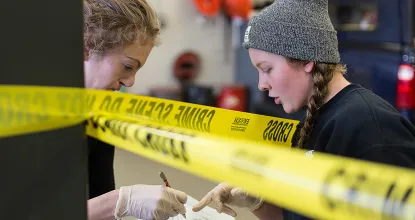Robert Forney
Contingent Special Instructor
By Anne Bradley, News Reporter
Real-world experience is the hallmark of teachers within the Loss Prevention Management program in the NMU Criminal Justice department, and Robert Forney is no exception. He has been with Lowe's as the Manager of Loss Prevention Training for nine years, and has recently begun as the Manager of Business Operations for the Learning and Organizational Effectiveness Department.
Being a professor is much different from working in the field, but Forney said he had no regrets. “It seemed like a good second job, and a chance to be part of something that would help people who want to get into the field or further their careers and would also benefit the [loss prevention] industry,” said Forney. “For anyone who is thinking of becoming a police officer, loss prevention probably has more to offer in terms of compensation and advancement. Compared to store operations positions (store managers, assistant managers) there is more opportunity, but it’s a very different discipline.”
Relating real world experience to the classroom is tough, but Forney says his years in training have helped insurmountably. He relates his experiences in training to new classroom techniques for his classes, “…mostly through assignments and discussions. I’ll have students visit a store and observe their EAS (Electronic Article Surveillance Systems) or CCTV (Closed Circuit Television) systems, or research an issue on the Internet. I’ll also use chats and discussions where people with experience can share their experiences.”
Anyone with a degree knows that it’s not the diploma but the job you have to live with. However, having that degree can be a huge boon in finding a job you love. “For now, what you learn [in loss prevention management courses] should help you to perform better on the job. Eventually, I think retailers will start requiring degrees for certain positions, but we’re probably a few years away from that point,” Forney said.
Forney holds that the best part of teaching is staying connected with people in the field who he probably wouldn’t get to meet otherwise, but working in the field has its advantages. “I guess my favorite part was always outsmarting the bad guys to make a big case,” he explained, “but now the best part is being able to make a difference and see the results of your efforts.”
Forney had three pieces of advice to give all students thinking about majoring in Loss Prevention Management. “For any students (not just loss prevention students), I would say to commit to whatever job/career that you decide to try. Give it a year or a year and a half before you decide whether it’s right for you. Set a time frame when you start the new job and commit to it until then. I’ve seen too many people take a new job and quit a month two into it (before they know enough about it to make a good decision). But, after the year or year and a half, if LP (or whatever career) isn’t for you, if you don’t love it, try something else. Don’t spend 10 years doing something that you don’t like and then try to make a change,” he said. In this rapidly growing industry, job opportunities abound. “Anyone who likes a challenge should think about a degree in Loss Prevention Management,” said Forney.

